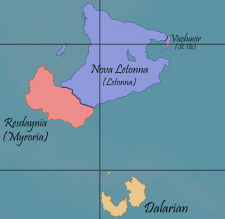Dalarian
| Dalarian Dalarejane Dalareyane | |||||
|---|---|---|---|---|---|
| |||||
| Motto: Catch up with and overtake life itself! | |||||
| Anthem: " | |||||
| Geography | |||||

| |||||
| Area | 128 000km2 | ||||
| Water (%) | 5,9% of landmass | ||||
| Highest point | 1 578m, Peak of Stars, Desha Kari, Tarell | ||||
| Longest river | 217 km, River Djorje, Altenia | ||||
| Demographics | |||||
| Population | 7 846 000, 2015 estimate | ||||
| • Density | 61/km2 | ||||
| • Growth | 3,2%/year | ||||
| Median age | 31 years | ||||
| Demonym | Dalari | ||||
| History | |||||
| First colonial settlements | ~1700s
| ||||
| Independence (from Eluvatar) | 1911-ish | ||||
| Government | |||||
| Capital | Tarele City, Desh Kahara, Tarell | ||||
| Official language | Reformed Dalari | ||||
| Type | Presidential Republic | ||||
| Legislature | |||||
| President | Nok, Foridezha | ||||
| Minister of Foreign Affairs | Kafa-Me, Eli | ||||
| Minister of Transport and Finance | Nok, Home | ||||
| Minister of Culture and Law | Mareka, Erisha | ||||
| Economy | |||||
| Currency | Dal (Đ) (D) | ||||
| GDP | 137,6 trillion Đ | ||||
| • Per capita | 17 540 Đ | ||||
| • Growth | 7,0%/year | ||||
| Sectors |
14% Agriculture | ||||
| Unemployment | 8% | ||||
| Gini | 32 | ||||
| Development | |||||
| Life expectancy | 68 years | ||||
| Improved water access | 100% | ||||
| Literacy | 93% | ||||
| Enrollment | 97% | ||||
| • Primary | 97% | ||||
| • Secondary | 81% | ||||
| • Tertiary | 31% | ||||
| Standards | |||||
| Measures | Eluvataran-Myrorian Standard (Metric) | ||||
| Date format | Day-Month-Year | ||||
| Traffic | Right-Hand | ||||
| Codes | |||||
| ISO code | DR | ||||
| Internet TLD | .dr | ||||
| Calling code | +152 | ||||
Dalarian (Allied States of) is a presidential federative republic, located south of the continent of Australis. It consists of 3 separate countries (Dalis) and 16 districts (Deshas), which correspond roughly to borders of pre-colonial tribes' lands, and modern-day mining operations.
Contents
[hide]Overview
History
Geography
Regional Division
Notable Landmarks
People
Religion
Languages
Government
Economy
According to Survey of 2013, more than a half of Dalarian's income comes from foreign trade. Country supplies the worldmarket with, mostly, oil, steel, and rare metals, which are found in abundance on the south of the archipelago. Most of the companies working in that field are owned by either government, or private bodies connected to it, as a result of a nationalisation movement of 1974-1978; The next biggest industry is tourism, which is privately owned, and transportation.
Transport
There are 3 main motorways spanning the country - two encircling islands of Tarele and Haleteni, and Main National Road, connecting Tarele City with Historical City of Aterasi via Doreveje Harbour (until 1963 the road was interrupted by a ferry line; since connected by Doreveje Bridge), with several two-lane roads connecting capitals of Deshas to those backbones. There is also a separate road network on the Dalakihe Islands, which is completely privately owned, and thus toll is charged for every usage.
Railways appeared by late 1920s, with first line connecting Tarele to Vade, a mining centre of the time. Up until 1947 lines were developed by separate companies and had differing standards, constructed on the basis of state-run auctions. Railway Network Acts of 1947, created as a reaction to agressive aquisitions of one of the companies, bought out all assets, and made previous owners prime shareholders of 3 new companies, dedicated each to maintenance and construction of tracks, rolling stock, and organising traffic. Decision met critical acclaim with projects of the next 20 years, such as connection to rail of 8 biggest cities, Doreveje Rail Bridge, and commuter rail system for Tarele. Network has not been expanded since late 1990s, with rise of air and car traffic share in transportation.
Dalarian has 2 airlines - Halekire Jera (est. 1937) is responsible for international traffic, and operates flights from three major airports in Tarele, Vade, and Kirava. Since it performs both scheduled and chartered flights, it is advised to consult the company directly to find the latest list of destinations. Dalajera (est. 1984) is a regional airline, operating between the three airports of Dalarian, harbours in Doreveje and Dalakire, as well as seasonal flights to Australis, and over the South Pole. Most of their fleet consists of local-made flying boats, and imported regional jets.
